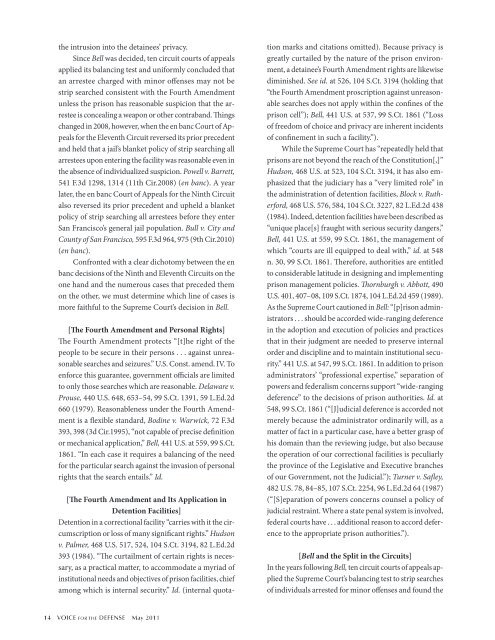for the defense for the defense - Voice For The Defense Online
for the defense for the defense - Voice For The Defense Online
for the defense for the defense - Voice For The Defense Online
Create successful ePaper yourself
Turn your PDF publications into a flip-book with our unique Google optimized e-Paper software.
<strong>the</strong> intrusion into <strong>the</strong> detainees’ privacy.<br />
Since Bell was decided, ten circuit courts of appeals<br />
applied its balancing test and uni<strong>for</strong>mly concluded that<br />
an arrestee charged with minor offenses may not be<br />
strip searched consistent with <strong>the</strong> Fourth Amendment<br />
unless <strong>the</strong> prison has reasonable suspicion that <strong>the</strong> arrestee<br />
is concealing a weapon or o<strong>the</strong>r contraband. Things<br />
changed in 2008, however, when <strong>the</strong> en banc Court of Appeals<br />
<strong>for</strong> <strong>the</strong> Eleventh Circuit reversed its prior precedent<br />
and held that a jail’s blanket policy of strip searching all<br />
arrestees upon entering <strong>the</strong> facility was reasonable even in<br />
<strong>the</strong> absence of individualized suspicion. Powell v. Barrett,<br />
541 F.3d 1298, 1314 (11th Cir.2008) (en banc). A year<br />
later, <strong>the</strong> en banc Court of Appeals <strong>for</strong> <strong>the</strong> Ninth Circuit<br />
also reversed its prior precedent and upheld a blanket<br />
pol icy of strip searching all arrestees be<strong>for</strong>e <strong>the</strong>y enter<br />
San Francisco’s general jail population. Bull v. City and<br />
County of San Francisco, 595 F.3d 964, 975 (9th Cir.2010)<br />
(en banc).<br />
Confronted with a clear dichotomy between <strong>the</strong> en<br />
banc decisions of <strong>the</strong> Ninth and Eleventh Circuits on <strong>the</strong><br />
one hand and <strong>the</strong> numerous cases that preceded <strong>the</strong>m<br />
on <strong>the</strong> o<strong>the</strong>r, we must determine which line of cases is<br />
more faithful to <strong>the</strong> Supreme Court’s decision in Bell.<br />
[<strong>The</strong> Fourth Amendment and Personal Rights]<br />
<strong>The</strong> Fourth Amendment protects “[t]he right of <strong>the</strong><br />
people to be secure in <strong>the</strong>ir persons . . . against unreasonable<br />
searches and seizures.” U.S. Const. amend. IV. To<br />
en<strong>for</strong>ce this guarantee, government officials are limited<br />
to only those searches which are reasonable. Delaware v.<br />
Prouse, 440 U.S. 648, 653–54, 99 S.Ct. 1391, 59 L.Ed.2d<br />
660 (1979). Reasonableness under <strong>the</strong> Fourth Amendment<br />
is a flexible standard, Bodine v. Warwick, 72 F.3d<br />
393, 398 (3d Cir.1995), “not capable of precise definition<br />
or mechanical application,” Bell, 441 U.S. at 559, 99 S.Ct.<br />
1861. “In each case it requires a balancing of <strong>the</strong> need<br />
<strong>for</strong> <strong>the</strong> particular search against <strong>the</strong> invasion of personal<br />
rights that <strong>the</strong> search entails.” Id.<br />
[<strong>The</strong> Fourth Amendment and Its Application in<br />
Detention Facilities]<br />
Detention in a correctional facility “carries with it <strong>the</strong> circumscription<br />
or loss of many significant rights.” Hudson<br />
v. Palmer, 468 U.S. 517, 524, 104 S.Ct. 3194, 82 L.Ed.2d<br />
393 (1984). “<strong>The</strong> curtailment of certain rights is necessary,<br />
as a practical matter, to accommodate a myriad of<br />
institutional needs and objectives of prison facilities, chief<br />
among which is internal security.” Id. (internal quotation<br />
marks and citations omitted). Because privacy is<br />
greatly curtailed by <strong>the</strong> nature of <strong>the</strong> prison environment,<br />
a detainee’s Fourth Amendment rights are likewise<br />
diminished. See id. at 526, 104 S.Ct. 3194 (holding that<br />
“<strong>the</strong> Fourth Amendment proscription against unreasonable<br />
searches does not apply within <strong>the</strong> confines of <strong>the</strong><br />
prison cell”); Bell, 441 U.S. at 537, 99 S.Ct. 1861 (“Loss<br />
of freedom of choice and privacy are inherent incidents<br />
of confinement in such a facility.”).<br />
While <strong>the</strong> Supreme Court has “repeatedly held that<br />
prisons are not beyond <strong>the</strong> reach of <strong>the</strong> Constitution[,]”<br />
Hudson, 468 U.S. at 523, 104 S.Ct. 3194, it has also emphasized<br />
that <strong>the</strong> judiciary has a “very limited role” in<br />
<strong>the</strong> administration of detention facilities, Block v. Ru<strong>the</strong>r<strong>for</strong>d,<br />
468 U.S. 576, 584, 104 S.Ct. 3227, 82 L.Ed.2d 438<br />
(1984). Indeed, detention facilities have been described as<br />
“unique place[s] fraught with serious security dangers,”<br />
Bell, 441 U.S. at 559, 99 S.Ct. 1861, <strong>the</strong> management of<br />
which “courts are ill equipped to deal with,” id. at 548<br />
n. 30, 99 S.Ct. 1861. <strong>The</strong>re<strong>for</strong>e, authorities are entitled<br />
to considerable latitude in designing and implementing<br />
prison management policies. Thornburgh v. Abbott, 490<br />
U.S. 401, 407–08, 109 S.Ct. 1874, 104 L.Ed.2d 459 (1989).<br />
As <strong>the</strong> Supreme Court cautioned in Bell: “[p]rison administrators<br />
. . . should be accorded wide-ranging deference<br />
in <strong>the</strong> adoption and execution of policies and practices<br />
that in <strong>the</strong>ir judgment are needed to preserve internal<br />
order and discipline and to maintain institutional security.”<br />
441 U.S. at 547, 99 S.Ct. 1861. In addition to prison<br />
administrators’ “professional expertise,” separation of<br />
powers and federalism concerns support “wide-ranging<br />
deference” to <strong>the</strong> decisions of prison authorities. Id. at<br />
548, 99 S.Ct. 1861 (“[J]udicial deference is accorded not<br />
merely because <strong>the</strong> administrator ordinarily will, as a<br />
matter of fact in a particular case, have a better grasp of<br />
his domain than <strong>the</strong> reviewing judge, but also because<br />
<strong>the</strong> operation of our correctional facilities is peculiarly<br />
<strong>the</strong> province of <strong>the</strong> Legislative and Executive branches<br />
of our Government, not <strong>the</strong> Judicial.”); Turner v. Safley,<br />
482 U.S. 78, 84–85, 107 S.Ct. 2254, 96 L.Ed.2d 64 (1987)<br />
(“[S]ep aration of powers concerns counsel a policy of<br />
judicial restraint. Where a state penal system is involved,<br />
federal courts have . . . additional reason to accord deference<br />
to <strong>the</strong> appropriate prison authorities.”).<br />
[Bell and <strong>the</strong> Split in <strong>the</strong> Circuits]<br />
In <strong>the</strong> years following Bell, ten circuit courts of appeals applied<br />
<strong>the</strong> Supreme Court’s balancing test to strip searches<br />
of individuals arrested <strong>for</strong> minor offenses and found <strong>the</strong>

















